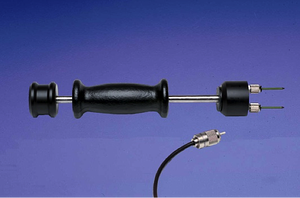 For testing the distribution of moisture in lumber and other building materials, few tools are as effective as pin-type moisture meters. These handy little devices can detect moisture with incredible precision and accuracy very quickly.
For testing the distribution of moisture in lumber and other building materials, few tools are as effective as pin-type moisture meters. These handy little devices can detect moisture with incredible precision and accuracy very quickly.
However, the basic pins that come with a given moisture meter for wood, concrete, or other building materials may not always enough for a given job. This is where the use of specialized electrodes comes into play.
What are Electrodes?
In relation to moisture meters, electrodes are attachments for a moisture meter that can be used to enhance said meter’s functionality. Some electrodes are made for specific tasks, while others are useful for a variety of tasks.
There are many, many different types of electrodes on the market for each of the moisture meter manufacturers out there. Today, we’ll be going over a few tips for choosing the right electrode for your situation or job:
Tip #1: Check with Your Manufacturer for Compatibility
One of the biggest problems some moisture meter users have with finding the right electrode for the job is matching up their electrode with their moisture meter in the first place. For some manufacturers, not every electrode is compatible with every moisture meter. Checking with the moisture meter manufacturer for recommended moisture meter/electrode combinations can help to minimize this particular difficulty.
As a side note, Delmhorst moisture meters and electrodes employ a universal connector design, so any Delmhorst electrode can be used with any Delmhorst moisture meter that has an electrode connector.
Tip #2: Use a Meter/Electrode Combination that is calibrated for the Material(s) to be tested
 Even when an electrode can connect to the meter you want to use, it is important to make sure that the meter itself is calibrated to measure moisture in the type of material you’re testing.
Even when an electrode can connect to the meter you want to use, it is important to make sure that the meter itself is calibrated to measure moisture in the type of material you’re testing.
For example, an electrode designed to check moisture in hay will produce more reliable results when attached to a moisture meter that has been calibrated for hay as opposed to one that is calibrated for wood. If a meter calibrated for wood was attached to the hay sensor, then the reading results would be qualitative at best, not quantitative.
Tip #3: Consider the Durability of the Electrode
Odds are that you’re planning to use an electrode, you’ll want to use it a lot for your work. Picking a moisture meter electrode built for durability can help prevent headaches further down the road.
Consider the design of the electrode as well when choosing for durability. Electrodes with longer pins, such as the 1235/18 18 inch-long hay electrode, are typically designed to penetrate more loosely-packed materials (e.g. hay). While tough, this electrode is poorly suited for use in lumber, as the tips are duller and the shaft of the electrode will be subjected to greater force.
For penetrating hardwood, an electrode with sharply pointed contact pins, such as the 26-ES electrode, is generally better and more durable.
Tip #4: Consider the Electrode’s Design
Some electrodes are built for a very specific use. As such, these electrodes might have very different design features from the norm.
For example, the 19-E/STC electrode looks very different from a standard electrode. Where most other electrodes feature two or more small, sharp pins, the 19-E/STC features two 5” long blades with a 35° angle bend in them near the middle point. The reason for this difference in shape from the norm is so that the blades of this electrode can more easily get between the wall and the baseboard to check for moisture, minimizing the need to remove base molding.
Other features to check for include insulation of the electrodes. For example, the 26-ES electrode is insulated except for the very tips of the electrode’s pins. This allows a wood moisture meter using the 26-ES electrode to measure moisture only at the depth of the pin-tips, which can be an enormous help when attempting to determine the exact distribution of moisture in a board of lumber or through a hardwood floor into the subfloor.
For more tips on picking the right electrode for the job, contact Delmhorst Instrument Co. today!
Comments